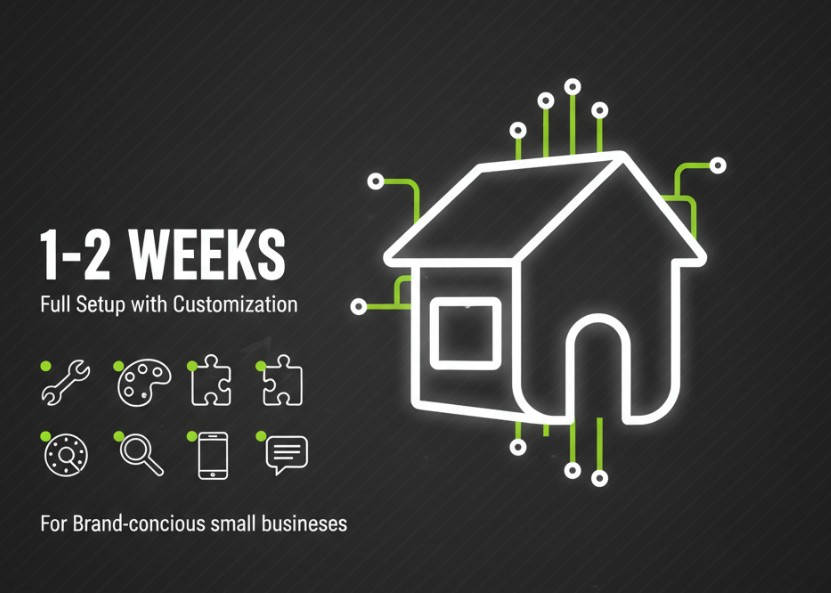Time is money in eCommerce, literally. Even a day’s delay can affect revenue, customer trust, and momentum. So it’s no surprise store owners ask how long does a BigCommerce to Shopify migration take before committing.
The timeline isn’t fixed; it bends based on catalog depth, design choices, and how efficiently teams handle approvals and testing along the way.
In this article, we will:
- Discover the exact migration timelines for stores of every size
- Track key checkpoints to keep your migration running on schedule
BigCommerce to Shopify Timeline: Exact Duration for Small to Enterprise Stores
The timeline for migrating from BigCommerce to Shopify varies dramatically based on your store's complexity and requirements. The key factor determining your migration duration isn't just the number of products; it's the depth of customization and functionality you need to replicate.
Here's exactly how long your migration will take based on your store size and complexity level:
Small Stores (Under 500 Products)
Perfect for startups, boutique stores, and small businesses
Data Migration Only: 1-2 Days
If you're looking for the fastest possible migration, focusing solely on transferring your essential data is your quickest route. This timeline includes:
- Product catalog transfer with basic details
- Customer information and contact data
- Order history for record keeping
- Basic testing to ensure data accuracy
Best for: Store owners who are comfortable with Shopify's default features and don't require extensive customization.
Complete Migration with Basic Theme: 3-5 Days
This approach gives you a fully functional store without breaking the bank on customization time. Your timeline includes:
- All data migration components above
- Theme selection and setup using Shopify's standard themes
- Basic branding implementation (logo, colors, fonts)
- Payment gateway configuration
- Shipping settings and tax setup
- Comprehensive testing across all store functions
Best for: Small business owners who want a clean, professional store quickly without complex design requirements.
Full Setup with Customization: 1-2 Weeks

For small stores that want to stand out from the competition, this timeline provides enhanced customization:
- Everything from the complete migration above
- Custom theme modifications to match your brand identity
- App installations for enhanced functionality
- SEO optimization and metadata setup
- Mobile responsiveness fine-tuning
- Content creation for key pages (About, FAQ, Policies)
- Thorough quality assurance testing
Best for: Brand-conscious small businesses that want a unique online presence but don't need enterprise-level features.
Medium Stores (500-2,000 Products)
Ideal for growing businesses with established product catalogs
Data Migration Only: 3-5 Days

Medium stores have more complex data relationships that require additional processing time:
- Product variants and options transfer
- Category and collection organization
- Customer segments and purchase history
- Inventory tracking setup
- Detailed testing for data integrity
The additional time accounts for the increased complexity of product relationships and the need for more thorough data validation.
Complete Migration with Theme Setup: 2-3 Weeks
This timeline provides a professionally designed store ready for serious business growth:
- All data migration components above
- Professional theme customization to reflect your brand
- Navigation structure optimization for better user experience
- Product page enhancements for improved conversions
- Search and filtering functionality setup
- Multi-payment gateway configuration
- Email marketing integration setup
- Analytics and tracking implementation
Best for: Growing businesses that need a professional online presence to compete effectively in their market.
Full Custom Migration: 2-3 Months
When you want to entirely customize your store as per your brand preferences, expect this extended timeline:
- Everything from a complete migration above
- Custom theme development from scratch or extensive modifications
- Advanced functionality implementation
- Third-party integrations (CRM, ERP, inventory management)
- Custom checkout processes and user flows
- Advanced SEO implementation with technical optimizations
- Multiple rounds of testing and refinement
- Staff training on the new platform
Best for: Established businesses with specific operational requirements and brand standards that demand unique solutions.
Large Stores (2,000+ Products)
Suitable for established retailers with extensive catalogs
Data Migration Only: 1-2 Weeks
Large stores require meticulous attention to data integrity due to their complexity:
- Bulk product processing with variant management
- Complex category hierarchies and relationships
- Advanced inventory tracking across multiple locations
- Customer segmentation and purchase history analysis
- Extensive data validation and error correction
- Performance optimization during import
The extended timeline ensures that no data is lost and all relationships between products, customers, and orders remain intact.
Complete Migration: 1-3 Months
Large stores need comprehensive planning and execution for successful migration:
- All data migration components above
- Enterprise-grade theme selection and customization
- Advanced search and filtering capabilities
- Multi-location inventory management setup
- Complex shipping rules and calculations
- Advanced payment processing configurations
- B2B functionality if required (wholesale pricing, customer groups)
- Extensive performance optimization
- Multi-phase testing, including load testing
Best for: Large retailers who need robust functionality but can work within Shopify's standard enterprise features.
Complex Enterprise Migration: 4-6 Months
When your store has highly specific requirements that go beyond standard e-commerce functionality:
- Everything from a complete migration above
- Custom application development for unique business processes
- Advanced third-party integrations (ERP, PIM, WMS systems)
- Custom API development for specialized functionality
- Multi-store or multi-brand setup and management
- Advanced automation workflows and processes
- Comprehensive staff training programs
- Phased rollout strategies to minimize business disruption
Best for: Large enterprises with complex operational requirements that need extensive customization.
Enterprise/Complex Stores
For major retailers and complex e-commerce operations
Standard Enterprise (Under 10,000 SKUs): 16-20 Weeks
Enterprise migrations require detailed project management and systematic execution:
- Comprehensive discovery phase (2-3 weeks)
- Architecture planning and technical specifications (2-3 weeks)
- Custom development and integrations (8-10 weeks)
- Extensive testing phases, including UAT (2-3 weeks)
- Soft launch and optimization (1-2 weeks)
This timeline accounts for the need for enterprise-grade security, performance, and scalability requirements.
Advanced Stores (Up to 50,000 SKUs): 20-30 Weeks

These projects involve substantial technical complexity and business process optimization:
- Extended discovery and planning phases (4-5 weeks)
- Complex data migration with multiple data sources (3-4 weeks)
- Advanced custom development (12-15 weeks)
- Integration with multiple enterprise systems (3-4 weeks)
- Comprehensive testing and optimization (3-4 weeks)
- Training and change management (2-3 weeks)
The additional time ensures that all enterprise systems work seamlessly together and business processes are optimized for the new platform.
Highly Complex Projects: 39+ Weeks
The most complex migrations can take nearly a year when they involve:
- Multi-brand or multi-store architectures
- Custom marketplace functionality
- Advanced B2B and B2C hybrid solutions
- Complex international requirements (multi-currency, multi-language, tax compliance)
- Extensive legacy system integrations
- Custom mobile applications development
- Advanced analytics and reporting systems
These timelines reflect the reality that some businesses have unique requirements that demand significant custom development and integration work.
Key Factors That Influence Your Timeline
These timelines are guidelines, and your actual migration duration depends on several critical factors:
- Data quality and organization in your current BigCommerce store
- Level of customization required for your new Shopify store
- Third-party integrations and their complexity
- Team availability and decision-making speed
- Testing thoroughness and quality assurance requirements
- Business continuity needs and acceptable downtime
Pro Tip: Always add a 20-30% buffer to your estimated timeline to account for unexpected challenges and ensure a stress-free migration experience.
The key to a successful migration is realistic planning and clear communication with your migration team about your specific requirements and constraints.
Stay on Track: 5 Critical Checkpoints That Keep Your Migration Timeline on Schedule
Even the best-planned migrations can derail without proper progress tracking. These essential checkpoints will help you monitor your migration's health and catch potential delays before they become costly problems.

Phase 1: Pre-Migration Checkpoint (Week 1-2)
Key Progress Indicator: Data audit completion and migration strategy approval
Foundation Complete Indicators:
- Complete data export from BigCommerce was successfully executed
- Migration tool selected and tested with sample data
- Shopify store setup completed with basic configurations
- Project timeline approved by all stakeholders
Red Flag Warning: If data export reveals more complexity than expected (custom fields, unusual product structures), add 25-50% buffer time immediately.
Milestone Approval Required: Stakeholder sign-off on migration scope and timeline before proceeding to the execution phase.
Phase 2: Data Migration Checkpoint (Mid-Migration)
Key Progress Indicator: 50% of core data successfully transferred and validated
Data Transfer Success Markers:
- Product migration completed without major data loss
- Customer data transferred with intact purchase history
- No critical errors in data mapping or formatting
- Performance benchmarks meeting expected speeds
Red Flag Warning: If you're seeing more than 5% data errors or significant performance issues, pause migration to address root causes. Continuing with faulty data costs more time later than fixing issues now.
Milestone Approval Required: Data quality sign-off before proceeding with theme and functionality setup.
Phase 3: Functionality Checkpoint (75% Complete)
Key Progress Indicator: All core store functions are operational and tested
Core Systems Operational:
- Payment processing is working across all configured gateways
- Shipping calculations are accurate for all zones and methods
- Inventory tracking is syncing properly
- User authentication and account management functionality
Red Flag Warning: Any payment or checkout issues should trigger immediate timeline reassessment. These problems compound quickly and affect revenue directly.
Milestone Approval Required: Functional testing approval from the operations team before moving to design finalization.
Phase 4: Design & SEO Checkpoint (90% Complete)
Key Progress Indicator: Store visually complete and SEO-optimized
Brand & Performance Ready:
- Theme customization matches brand guidelines
- Mobile responsiveness tested across devices
- 301 redirects are properly configured and tested
- Site speed meets performance benchmarks
Red Flag Warning: If mobile experience issues emerge late in the process, expect 3-5 additional days for responsive design fixes.
Milestone Approval Required: Final design and SEO approval before go-live preparation.
Phase 5: Go-Live Checkpoint (Launch Ready)
Key Progress Indicator: All systems tested and launch sequence prepared
Launch Readiness Confirmed:
- End-to-end testing completed successfully
- DNS changes prepared and scheduled
- Backup systems are in place and verified
- Team training completed on the new platform
Red Flag Warning: Never rush the final testing phase. Issues discovered after launch are 10x more expensive to fix than issues caught in testing.
Milestone Approval Required: Final go-live approval from business leadership and technical teams.
Migration checkpoints are not just status updates; they’re your roadmap to an on-time launch. By tracking progress indicators, watching for early red flags, and tightening approval workflows, you transform your migration from a guessing game into a predictable, well-managed project.
Every Migration Clock Reflects Strategy More Than Complexity
The timeline isn’t defined by product counts alone; it hinges on preparation, approvals, and execution. Small stores may finish in days, while complex operations can stretch across months, but strategy always sets the pace.
Choosing a trusted BigCommerce to Shopify migration service helps you avoid delays, protect data, and launch smoothly. To ensure your migration is seamless and growth-focused, learn about Velt2 and discover how expert guidance keeps every clock on track.







.jpg)

%20(1).jpg)
%20(1).jpg)
